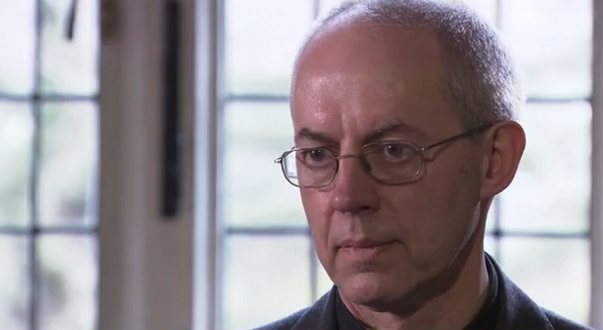So the Archbishop of Canterbury has called for yet another meeting of the Primates of the Anglican Communion for October, 2017. As if this meeting could cure the wound that has been made even more incurable by his own personal failure to uphold the recommendations of the meeting he called in January of this year—failures that I documented several weeks ago in “At this point, why should we care about the Anglican Communion?”.
When I last wrote about this, I emphasized the Archbishop’s failure to defend the special role of Bishops to guard the doctrine, discipline and order of the Church. This is precisely the authority that the Chair of the Anglican Consultative Council specifically repudiated. That repudiation proved two things:
(1) The existing “Instruments of Unity” (the Archbishop of Canterbury, Lambeth Bishops Conference, Primates meetings and Anglican Consultative Council) are not only irrevocably broken, they are at odds with each other, and
(2) the Archbishop of Canterbury has, by his silence and passivity, made things worse
So whatever role the Archbishop of Canterbury may wish to play in any future meetings of the Primates, his credibility has been severely damaged by his actions. Why should anyone expect this Archbishop of Canterbury to help fix the mess when he allowed the ACC-16 meeting in Lusaka to negate the January 2016 Primates “relational consequences” for The Episcopal Church (TEC) in less than four months—a record that beats the year it took his predecessor, Archbishop Rowan Williams, to unravel the consequences the Primates placed on TEC in their 2007 Communique from Dar es Salaam.
No, the October 2017 Primates meeting will be for damage control. I believe Archbishop Justin Welby is calling this meeting to try and prevent Primates from breaking Communion with the Church of England after their expected “generous pastoral accommodation” of same sex unions—at the very least providing a liturgy for the blessing of same-sex civil partnerships. This widely expected action by the Church of England will be the final and irrevocable repudiation of official Anglican Communion teaching on human sexuality in Lambeth Resolution I.10 (1998). But could the October 2017 Primates meeting also be an attempt to split the growing coalition between the Biblically clear and faithful Primates of GAFCON and the Global South—especially as it comes on the eve of GAFCON 2018 in Jerusalem?
I could say so much more, but my friend the Rev. Chuck Collins beat me to it in a pointed and strong post yesterday:
“Anglicans don’t need Canterbury. It’s a bogus lie that we are defined by our relationship with a man who may or may not uphold the Word of God, the Word that lasts forever when everything else withers and fades like grass. Defining ourselves by our relationship to the Archbishop of Canterbury is a novel idea that has weaseled its way into modern thinking. Anglicans are Anglican because of the theology that defines us, that is enshrined in God’s word written, in the Anglican formularies, and in the Anglican Divines. Canterbury is as helpful as he is faithful to our Anglican heritage, otherwise we don’t need him. Prop him up as a centerpiece at a Palace dinner with tall flowers in a big vase, but don’t determine your bearings by someone who has no courage (to) uphold a rich and rooted heritage.”
Father Chuck knows what he is talking about when he refers to our “rich and rooted heritage” as Anglicans. I highly commend his book Reformation Anglicanism: Biblical-Generous-Beautiful to you. He does a masterful job summarizing what it means to be a follower of Jesus Christ in the Anglican way, according to the rich roots and heritage that we enjoy that go back to the great Anglican reformers themselves. It’s an especially readable book for confirmation and other classes in your local church.
In reality, it was not until Lambeth 1930 that the Archbishop of Canterbury became essential to membership in the Anglican Communion. Lambeth 1930 Resolution 49 declared for the first time that the Anglican Communion is “a fellowship… [of] Churches in communion with the See of Canterbury.” This definition of Communion is a relic of a more colonial past that no longer serves the biblical clarity, faithfulness, and mission of the majority of Anglicans. But even on its own terms, Lambeth 1930 Resolution 49 qualifies this definition of Communion with Canterbury according to doctrinal faithfulness! The Churches themselves “must uphold and propagate the Catholic and Apostolic faith and order as they are generally set forth in the Book of Common Prayer as authorized in their several Churches.” (Lambeth 1930 Res. 49, clause (a)) In Resolution 48, the Lambeth 1930 Conference further affirmed “the true Constitution of the Catholic Church involves the principle the autonomy of particular Churches based upon a common faith and order” (Emphasis added).
You see, we really ARE Anglicans by the theology that defines us. We are Anglicans by a shared or “common faith and order.” Our Churches are “Anglican” only insofar as they propagate that Catholic and Apostolic faith and order that we find according to the Holy Scriptures and shared by all Christians at all times and in all places. That’s what “catholic” means—“kat holos,” of the whole body of Christians geographically, numerically and across time. And the genius of Anglicanism is that it is a “Reformed Catholicism.”
Therefore Canterbury is only as helpful as he is faithful to our shared Apostolic, Biblical and Reformed Catholic roots. Even The Principles of Canon Law Common to the Churches of the Anglican Communion (2009), a summary of a kind of “common law” among the Churches of the Anglican Communion, recognizes this in its definition of what it means to be “Anglican”:
“The relationship of ecclesial communion within the Anglican Communion is based on the communion of a church with one or more of the following: (a) the See of Canterbury…; or (e) all churches which profess the apostolic faith as received within the Anglican tradition.” (Principle 10: The Fellowship pf the Anglican Communion, p. 25, emphasis added).
Today, it is GAFCON and Churches in the Global South that profess the apostolic faith as received within the Anglican tradition—Biblical, Apostolic and Reformed Catholic. They do not need the Archbishop of Canterbury to re-form and return the Anglican Communion to those rich roots and heritage. It is now time for those Biblically faithful leaders in GAFCON and the Global South to join hands and do so. There is a way forward—and it lies not through Canterbury and the existing Instruments. I will have more to share about this conciliar way in the weeks and months ahead.



